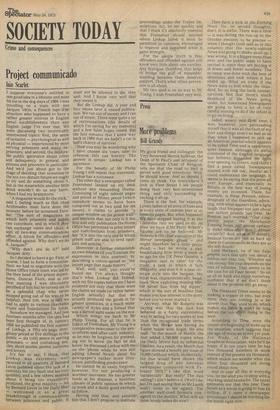SOCIETY TODAY
'Crime and consequences
Project communicado
Lain Scarlet
I suppose everyone's entitled to one good idea in a lifetime and mine hit me in the dog days of 1966. I was travelling on a train with one Jacques Wrin, a French juge d'in struction who happened to have a rather greater interest in English penal establishments than any English judge I've ever met. We were discussing two inextricably intertwined topics: first, the sense of isolation — psychological as well as physical — experienced by most serving prisoners and many exprisoners; and second, the deplorable public ignorance about crime and delinquency in general, and prisons and prisoners in particular. And we'd just about got to the stage of deciding that sometime in the not-too-distant future we ought to try and do something about it, but in the meanwhile another little drink wouldn't do us any harm, when I had my brainstorm. "A magazine would do the trick," said I, feeling much as that chap Archimedes must have done the moment before he screamed Eureka! "The sort of magazines to Which both prisoners and public can contribute, and in which they can exchange views and ideas. A sort of two-way communications effort. A forum for offenders and Offended against. Why don't we do it, Jacques?" "Why don't you do it?" said Jacques drily.
So I decided to have a go. First, of course, I had to form a committee. Next we had to negotiate with the Home Office (their team was led by the then head of the prison department, Duncan Fairn, and at our first meeting I was absolutely petrified of him but he turned out to be a splendid chap who never stopped going out of his way to be helpful); then (oh, woe is me) we had to apply to various charitable trusts and foundations for funds.
Somehow we managed. And just fourteen months after the idea had been first thought of, in January 1958 we published the first number of Linkup, a fifty-six-page semiglossy priced at five shillings to the public — six (old) pence to serving Prisoners — and containing articles, short stories, poems, cartoons, and letters.
It's fair to say, I think, that Linkup was extremely well received in all quarters. If Bernard Levin quibbled about the lack of a contents list (my fault and his only quibble), and a few others moaned about it being too expensively produced, the great majority —.led by Bernard Levin in the Daily Mail — welcomed it as a great breakthrough in communications between prisoners and public. It must not be allowed to die, they said. And I know very well that they meant it.
But die Linkup did. A year and four issues later it ceased publica tion. We ran out of money and I ran out of steam. There were quite a lot of recriminations (the details of which I'm saving for my memoirs) and a few false hopes raised. But the fact remains that I knew way back in 1969 that we hadn't a cat in hell's chance of survival ...
Now you may be wondering why I have chosen six years later to
rehearse this sad history. The answer is simple: Linkup has a successor.
For the benefit of Mr Philip Young I will repeat that statement. Linkup has a successor.
The other day a newspaper called Frontsheet landed on my desk without any resounding thump.
Consisting of eight tabloid pages and priced at fifteen pence (which somehow seems to have been computed out at two quid for six issues), it claims to provide "a unique window on the prison wall" and explains that not only is it the first and only publication the Home Office has permitted to print letters and contributions from prisoners, but "it is also the only one to which prison staff are able to send opinions and articles."
Moreover, it further compounds its own felonies (if you'll excuse the expression in this context) by
describing a centre-spread as "the letters page that made history." ' Well, well, well, you could've fooled me. I've always thought
that's what Lin up did. Indeed, with my file copies before me I have evidence not only that those were the claims we made (in rather better English actually) but that we actually produced the goods in far greater quantities, in a much wider variety of styles and a format that was a darned sight easier on the eye. Which brings me back to Mr Philip Young. For all that he is Editor of Frontsheet, Mr Young is a comparative newcomer to the penal-reform-and-after-care industry, so he may be forgiven for' pretend ing not to know (In fact he did know: he discussed Linkup with me on the 'phone while he was still editing Liberal News) about his newspaper's rather more illustrious, pathfinding predecessor. He cannot be so easily forgiven, however, for not producing a worthier successor. He has greater funds at his disposal, a healthier climate of public opinion in which to work and a damn good example to follow.
Having said that, and assured him that I don't propose to institute
proceedings under the Trades Descriptions Act, let me quickly add that I think it's absolutely essential that Frontsheet should succeed where Linkup failed: it must be permitted to continue, encouraged to .improve and sustained while it gains strength.
For the simple truth is that offenders and offended-against still know very little about one another. Any dialogue, therefore, that helps to bridge the gulf of misunderstanding between them deserves support. That's what crime prevention is all about.
My two quid is on its way to Mr Young. I wish Frontsheet very well.
Press


























 Previous page
Previous page